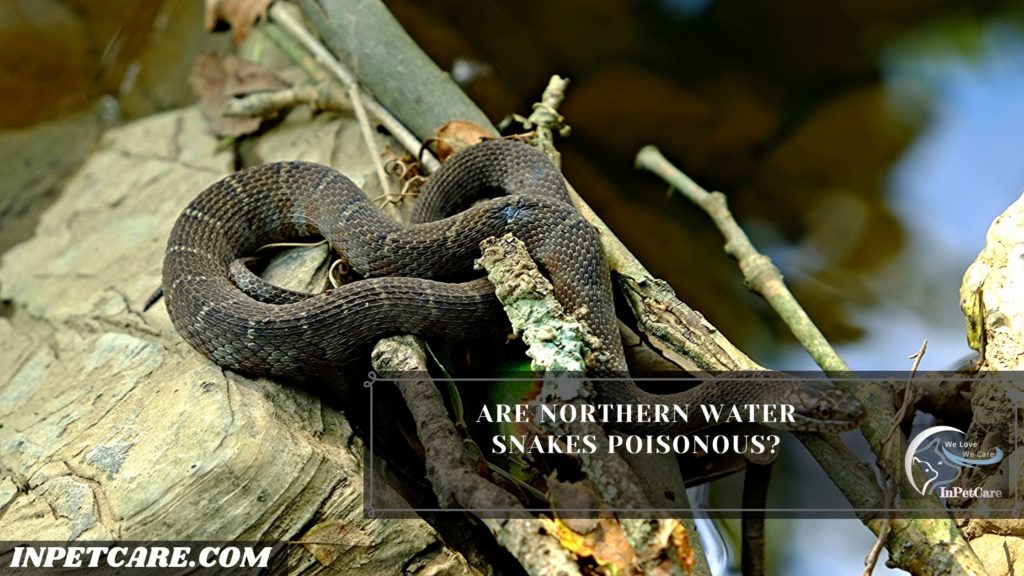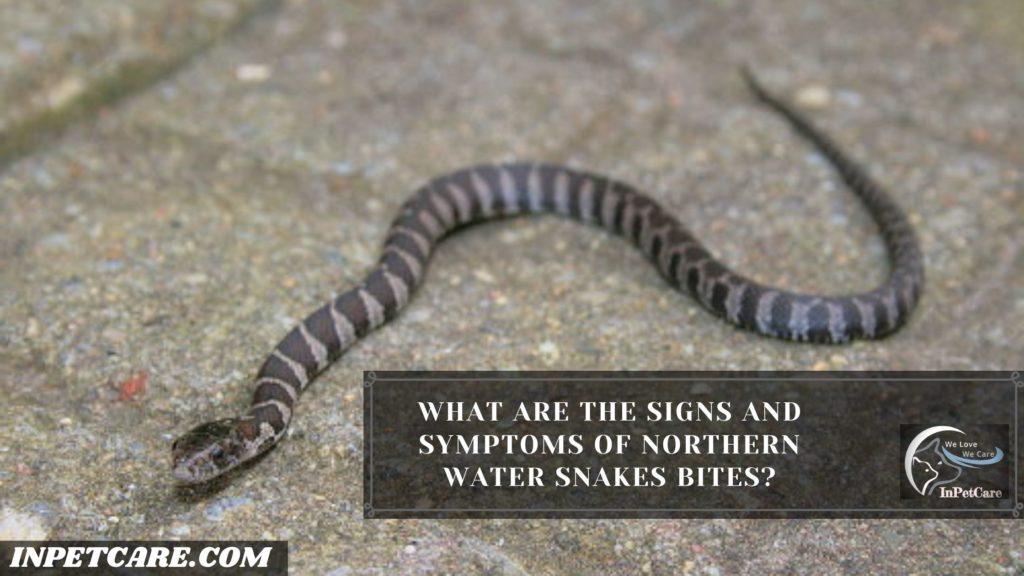Do you love swimming and you are worried about swimming because you live on the Northern side? If you are worried about facing a Northern water snake then it is obvious to ask if they are going to be poisonous or not.

In this guide, I am going to give you all the information that is needed for you to know about Northern water snakes as non-poisonous snakes.
Post Contents
Are Northern Water Snakes Poisonous?
Fortunately, Northern water snakes are neither poisonous nor venomous. All the water snakes are non-poisonous snakes that are found in North America. So you can rest assured if you live on the Northern side of America about facing water snakes. However, they can bite you and can leave a bacterias with the wound that need to be treated but it is very easy to tackle & treat.
Now, after knowing that all the water snakes of Northern America are non-poisonous and nonpoisonous, you may think that you are completely safe but you are not because you can also get a bite from them while you will be swimming on the pond or lake.
They can bite you if they feel threatened, provoked, or irritated. Their bite contains lots of harmful bacteria that are fatal to humans and have the potential to cause some infections if they are not treated asap.
That is why I have brought you this guide in which you will learn how you can treat Northern water snakes bite and along with that, I will also give you some space of information about how you can prevent getting a bite from a water snake.
So to know that, go through the whole article. Let’s begin with the signs and symptoms of water snakes bite.
What Are The Signs And Symptoms Of Northern Water Snakes Bites?

There are lots of signs and symptoms that you can experience after getting a bite from Northern water snakes but, we are going to discuss the most common signs and symptoms that you are likely to experience in your skin after getting the initial bite from Northern water snake.
The common signs and symptoms are
- Two puncture wound
- Pain at the bite area
- Redness around the wound
- Itch round the wound
- Excessive sweating
- Excessive saliva
- Bruising
- Weakness
Signs and symptoms that are very rare to appear, if this kind of symptoms or signs appears on you then maybe you have been bitten by a venomous snake, not a non-venomous water snake.
- Numbness in the face or limb
- Weakness
- Problem in breathing
- Blurred vision
- Two puncture wound
- Vomiting and nausea
Now, after knowing the signs and symptoms that you can experience from a non-venomous water snake and a venomous snake.
Now, we are going to know how you can treat a bite if you get it from non-venomous water snakes.
All water snakes are non-venomous but there are some snakes that can swim and are not considered water snakes and they can be venomous.
Other Snakes? That Makes Good Pet (Click to know if they are venomous or not)
| White Snakes | Northern Water Snakes | Hognose Snakes |
| Black Racer Snakes | Grass Snakes | Black Rat Snakes |
| Rattlesnakes | Bull Snakes | Eastern Hognose Snakes |
| Green Snakes | Ringneck Snakes | Kingsnakes |
How To Treat A Bite Of Non-Venomous Northern Water Snakes?

There are five simple and straightforward steps that you can follow in order to treat the bite. The bite is going to be very small and there will be very minor bleeding.
However, if you experience that you are feeling more pain than you should be or the bleeding is very aggressive then you may need some stitches or you may have been bitten by a venomous snake so you must seek medical health support. Call for an ambulance.
But if you live in the Northern part of America then you are likely to get a bite from nonvenomous water snakes so we are going to discuss that one.
If you get a bite from them, then the wounds are going to be very small and bleeding will be little to nothing at all. You can treat it by yourself by following these 5 steps. Let’s know that
- First, after getting the initial bite from the water snake, you must get yourself off the water if you are swimming or must keep the distance from the snake after getting the bite.
Now, you need to rinse off the wound with fresh and clean water. - After rinsing off the wound with fresh and clean water, you need to apply mild antibacterial soap to clean the wound.
Make sure that you don’t use any kind of cleanser or soap that contains hydrogen peroxide or alcohol as it can irritate the skin and can also damage all the essential and healthy tissues that is needed for the faster recovery. - Now, after cleaning the wound, you need to dry the wound by bloating it with a soft cloth. Remember the clothes should be soft and you don’t apply too much friction over it.
Alternatively, you can also use a fresh towel or cotton. We would recommend you to use cotton instead of Towel and cloth. - After drying the wound, you may think that you need to bandage given but we would not recommend you because when you bandage a wound, it makes the area dark, moist, and warm which is the perfect breeding ground for bacterias. The risk of infections can get increase. Don’t reply to a bandage.
- If you feel that there is a risk of cross-contamination then you can apply a bandage and if you feel that you have been bitten by a venomous snake then you must call for an ambulance and till then you must keep your body still.
These are these five simple and straightforward steps that you need to follow in order to treat a bite from a nonvenomous snake, it doesn’t matter if it’s a water snake or a ground snake.
If it is a non-poisonous snake then you can easily use these steps to treat the bone. How can I know if the snake is non-poisonous or poisonous?
Other Snakes ? That Makes Good Pet (Click to know if they are venomous or not)
| White Snakes | Northern Water Snakes | Hognose Snakes |
| Black Racer Snakes | Grass Snakes | Black Rat Snakes |
| Rattlesnakes | Bull Snakes | Eastern Hognose Snakes |
| Green Snakes | Ringneck Snakes | Kingsnakes |
How To Identify If The Snake Is Poisonous Or Nonpoisonous?
Simple answer – if the snake has fangs then they are poisonous and venomous. On the other hand, if the Snake has teeth instead of fangs then they are non-poisonous.
It is very difficult to notice because you are not going to open its mouth if they have fangs or teeth but if you will notice closely, then you can easily get if it is poisonous or not.
All the venomous and poisonous snakes have fangs, while all the nonpoisonous and non-venomous snakes have teeth instead of fangs.
I hope you got it. And now you can identify one. If you are still confused then you can check this article.
Now, it is very important for you to know how you can prevent the bite from the Northern water snake. Let’s know that
How To Prevent Northern Water Snake Bite?
You are more likely to face a Northern water snake when you will be swimming, so if you really want to be cautious about it then follow these tips.
Here are the tips that you need to follow in order to prevent the snake bite of the Northern water snake.
- Don’t swim in the lake or pond if the water is very dirty or contaminated.
- If you see a snake while you are swimming then you must keep your distance and you need to get off the water as soon as possible.
- Don’t follow snake if you see one and always make sure that you don’t throw stones or anything like that on the water as it can frighten them and can make them aggressive towards you.
- Don’t enter a territory if you don’t know if it’s a snake territory or not. Avoid entering in snake territory.
- If you need to enter a snake territory then make sure that you wear protective clothing like boots, leather jackets, leather gloves, and long pants.
- Ask the local if the pond or lake is full of snakes or not. You can easily know by asking this simple question.
- Avoid going out near the lake at night as snakes tend to be more nocturnal at night.
- They can also attack visitors as a welcome gift because they can get frightened or provoked or can feel threatened.
- Don’t approach a snake if you see one and keep your distance from it.
- Don’t handle a Northern water snake even they are non-poisonous because handing them can make them feel frightened, provoked, anxious and irritated, resulting in a quick strike of bite.

The FAQ (Frequently Asked Questions)
Can Northern Water Snakes Swim Faster Than Humans?
Yes, the Northern water snake can swim faster than humans for sure. That is why it is required to get yourself off the water if you see a Northern water snake. Even they are non-poisonous, they can bite you and inject bacteria that can cause infections to you.
Can Northern Water Snakes Kill You?
There is one thing I can assure you that a Northern water snake wouldn’t be able to kill you because they don’t have any kind of venom gland present in their body and they don’t also have fangs to inject Venom. They can only bite you and the bite is not fatal to humans.
Do I Need To Visit Hospital After Getting A Bite From A Northern Water Snake?
No, you don’t need to visit a hospital if you get a bite from a Northern water snake. However, if you don’t know how to treat the wounds that you may need to visit the hospital ASAP. But if you know how to treat the wounds then treat it and visit for a quick health checkup only to ensure that the risk of infection is zero.
Check More in Snake Category
Other Snakes ? That Makes Good Pet (Click to know if they are venomous or not)
| White Snakes | Northern Water Snakes | Hognose Snakes |
| Black Racer Snakes | Grass Snakes | Black Rat Snakes |
| Rattlesnakes | Bull Snakes | Eastern Hognose Snakes |
| Green Snakes | Ringneck Snakes | Kingsnakes |

94% of pet owners say their animal pal makes them smile more than once a day. In 2007, I realized that I was made for saving Animals. My father is a Vet, and I think every pet deserves one. I started this blog, “InPetCare”, in 2019 with my father to enlighten a wider audience.
